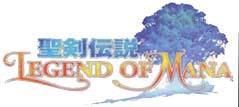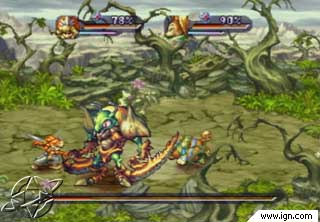|
|

|
BATTLE SYSTEM
|

|
INTERACTION
|

|
ORIGINALITY
|

|
STORY
|

|
MUSIC & SOUND
|

|
VISUALS
|

|
CHALLENGE
|
Easy
|
COMPLETION TIME
|
8-15+ Hours
|
|
OVERALL
2.0/5
|
Rating definitions
|
|
|
Many gamers considered Secret of Mana, when it came out on the Super NES over a decade ago, one of the greatest action RPGs of all time. Its sequel, Seiken Densetsu 3, unfortunately wouldn't see a North American release, leaving gamers to wonder if the Mana series would eventually return to consoles. Near the turn of the millennium, Squaresoft announced the development of Legend of Mana, which saw its North American release on the Sony Playstation in 2000. Though it has a few things going for it, Legend of Mana doesn't live up to its predecessors.
One reason for this is the battle system, which, like in previous Mana games, is real-time. As with before, enemies are visible in the game's dungeons and fields before players engage them with a party of up to three characters, and once the player draws near them, the screen locks into place and battle begins. Each character has an HP gauge and a skill gauge that gradually fills as they beat up the enemy, which allows for the use of special skills occasionally gained when using certain weapons, which the player can assign to the L and R buttons. When defeated, enemies drop items or experience crystals and money, which the player must pick up before they ultimately vanish.
There are many shortcomings with the battle system, such as the constant tedium of picking up experience crystals and money in the middle of battle, the poor hit direction of normal attacks and special skills, the inability to run from battles, and the like, although the biggest problem is the general ease of combat. A character only remains temporarily unconscious if he or she loses his or her HP, although after a few minutes, the character will revive. There are also no consumable items aside from occasional HP-replenishing items dropped by enemies, and after battle, all characters regain lost HP. Boss fights aren't terribly strategic either, with many politely flashing to indicate they're about to perform a devastating skill; even the last boss is a cakewalk. Overall, the battle system is certainly not a draw to the game, with even previous Mana games having had better combat systems.
 At least it has good graphics
At least it has good graphics
|
|
Interaction is better, though that isn't saying a lot. The menus are clean, easily navigable, and hardly intrusive, although the game at many points doesn't provide the player a good direction on how to advance the main storyline (which is to a large extent inexistent), with a guide often being necessary to do so. Unlike its predecessors, Legend of Mana utilizes a mission system where the player performs many random tasks that ultimately lead towards the end, with a guide, again, being necessary to discover them all. There's also a rather unnecessary system where the player occasionally gains artifacts to place on a world map to make new places appear. Overall, interaction isn't bad, although the general lack of direction does somewhat intrude the player.
Squaresoft did do a nice job making Legend of Mana feel different from its predecessors, even if these changes were, to a large part, for the worse. The story, as mentioned, is largely inexistent, mostly consisting of random, seemingly disjointed missions ultimately leading to the end, with little character development and scant backstory. There are no major surprises, twists, or any sense of intrigue, and in the end, the story is hardly a selling point for the game.
The developers, however, did a good job making Legend of Mana both sound and look nice. Yoko Shimomura provided a nice soundtrack that hits more than misses, with few weak tracks aside from an over-bombastic boss battle theme. The visuals are beautiful as well, with nice hand-drawn scenery and nice sprites, though some of the dungeons do seem to reuse exactly the same scenery at points. Overall, the visuals and music are two areas where the game actually succeeds.
Finally, Legend of Mana is fairly short, taking somewhere from about eight to fifteen hours the first time through, with a New Game+ allowing for additional playthroughs and discovery of missions missed during the first playthrough. All in all, Legend of Mana had the potential to be a masterpiece, given its uniquenesses, beautiful music, and nice visuals, but severely stumbles because of its simplistic battles and unengaging storyline. Even if you enjoyed prior installments, you might have a hard time enjoying Legend of Mana.
Review Archives
|









